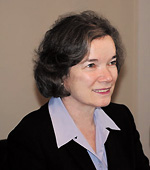At Home in the Wide Open Spaces
Open gallery

For Penny Harrison and her friends, “You’ll want that day back!” is code for a book that isn’t worth reading. This simple shorthand has saved them a lot of wasted time over the years.
“Time takes on a different dimension when you’re older,” says Harrison, former editor in chief of Lewis & Clark Law School’s prestigious Environmental Law review. “You want to be sure what you’re doing is worthwhile.”
That’s why she took her time launching Open Spaces: Views from the Northwest.
Compared by some to the Atlantic Monthly, Open Spaces is a quarterly magazine featuring Northwest voices from a variety of viewpoints. The publication offers well-written, insightful articles on politics, culture, science, music, business, art, education, philosophy, health, food, travel, and gardening, as well as fiction, essays, poetry, and art.
“The Atlantic Monthly has about 150 years on us,” says Harrison. “Although we take ourselves seriously, we strive to offer a blend of the serious and the light.”
The concept for the magazine first emerged during Harrison’s tenure as editor of the law review. As she talked with people from across the country, she discovered they were eager for information about Oregon’s innovative environmental programs and land-use planning.
Ten years later–after working in the Oregon Attorney General’s Office and serving on the board of Doernbecher Children’s Hospital–Harrison was certain that those in the Pacific Northwest had valuable insights to share on regional, national, and international issues. She decided to launch Open Spaces.
Working with a team of editors and an impressive 14-member board of directors (including David Savage, professor emeritus of history, and Dr. Robert Sack ‘64), Harrison says she solicits about 90 percent of the magazine’s content from well-respected leaders in fields such as business, law, education, medicine, politics, and industry. She savors the back-and-forth process of working with authors to help tease out their ideas and style.
Harrison says that subscriptions, targeted at key decision makers in the community, run in the thousands while online visits (www.open-spaces.com) last year reached 100,000. An article on the purpose of copyright by Lydia Loren, interim law school dean, ranks first in articles accessed online, followed by Vogue contributing editor Robert Sullivan’s comprehensive piece on Bigfoot.
At the end of the day, Harrison’s aim is to leave readers satisfied with the time they invest online or sitting down with a copy of Open Spaces. “I never want to hear from readers, ‘You’ll want that day back!’”
–by Pattie Pace
More L&C Magazine Stories
Lewis & Clark Magazine is located in McAfee on the Undergraduate Campus.
MSC: 19
email magazine@lclark.edu
voice 503-768-7970
fax 503-768-7969
The L&C Magazine staff welcomes letters and emails from readers about topics covered in the magazine. Correspondence must include your name and location and may be edited.
Lewis & Clark Magazine
Lewis & Clark
615 S. Palatine Hill Road MSC 19
Portland OR 97219

